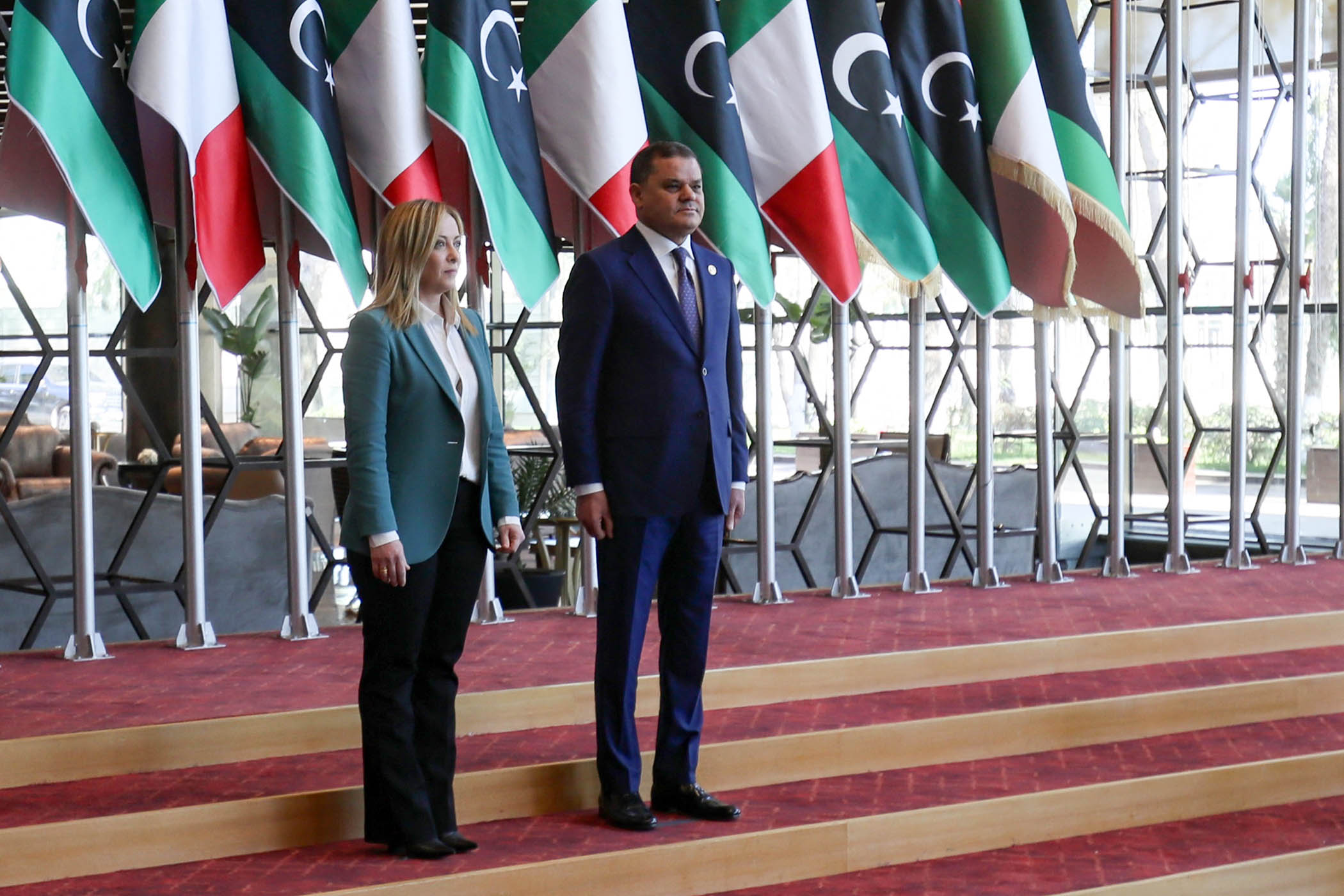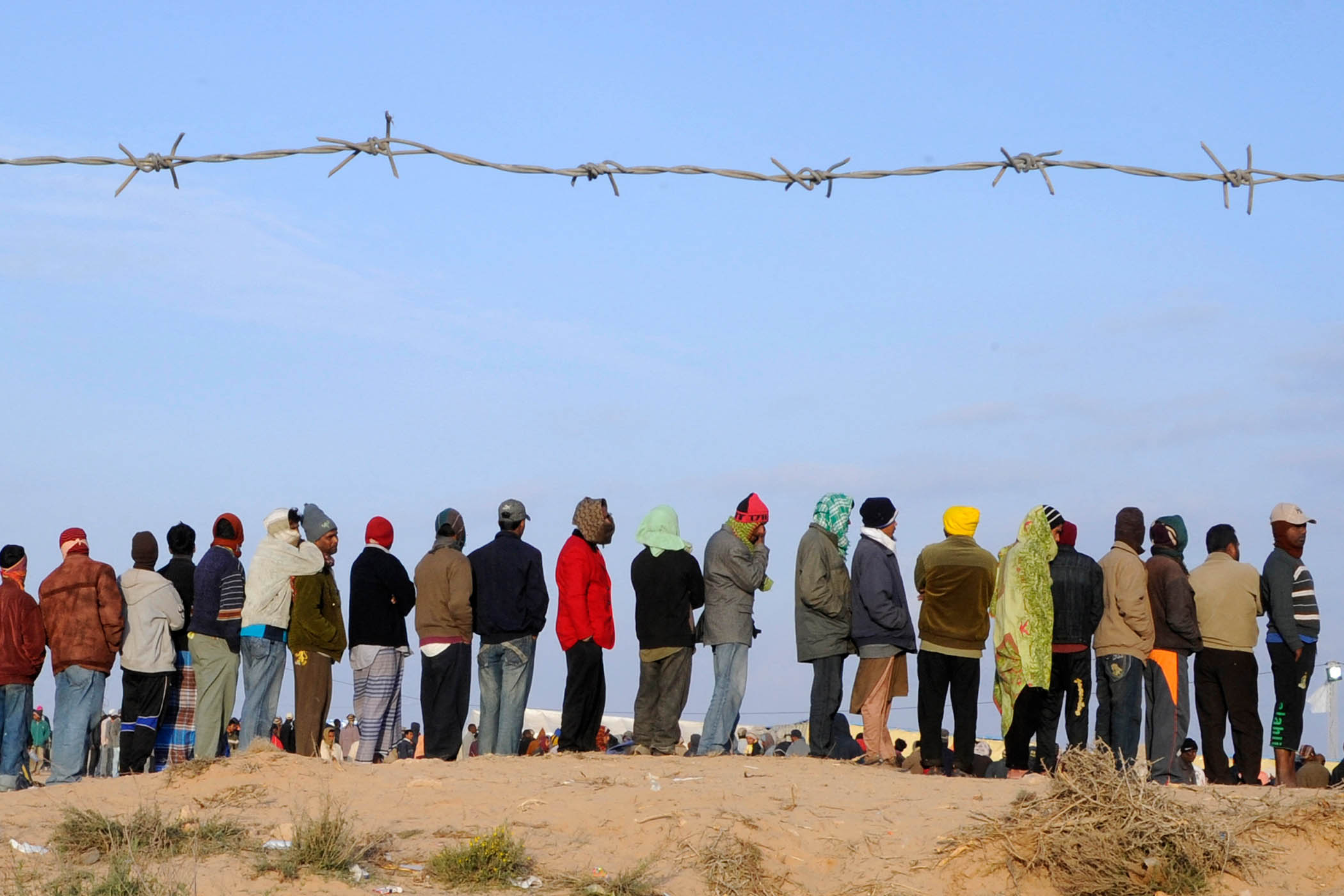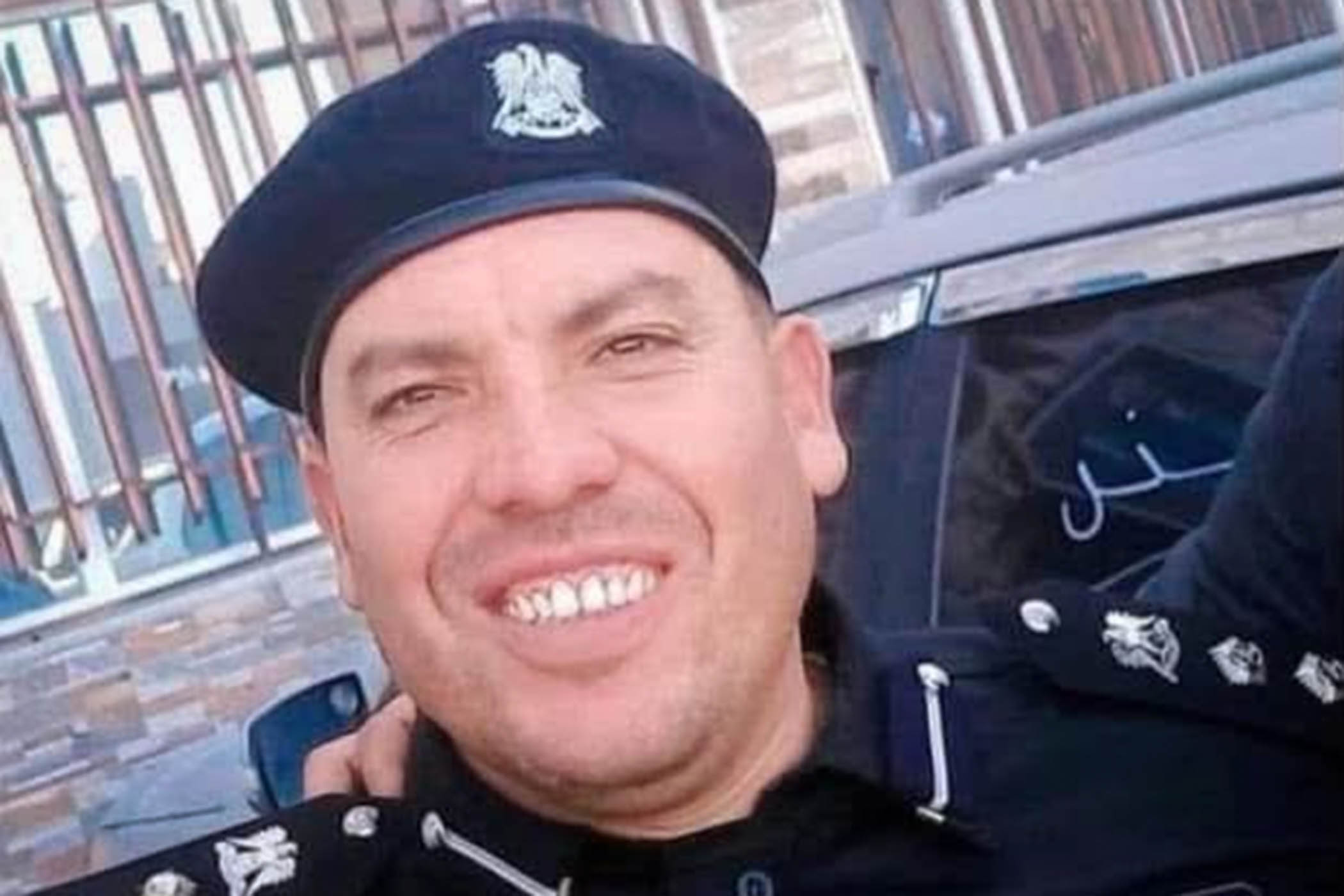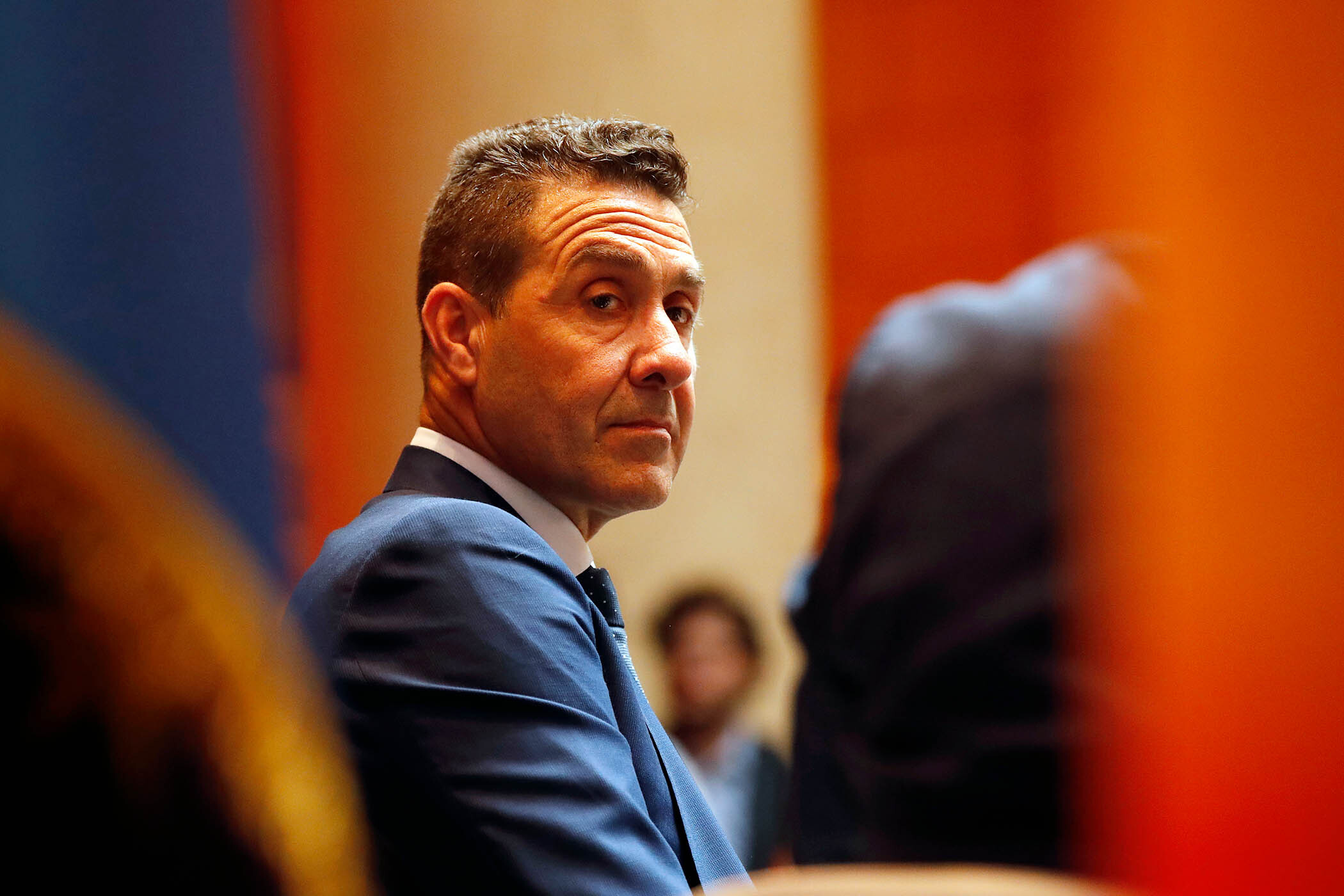In January 2025, a man stepped off an Italian government jet in Tripoli and disappeared back into the shadows of one of the world’s most brutal migration control systems.
Osama Al-Masri Njeem had spent years running Mitiga prison, a Libyan facility described by the United Nations as a hub of mass detention, torture, rape and forced labour. Days earlier, he had been arrested in Turin under an International Criminal Court (ICC) warrant charging him with crimes against humanity, including murder, sexual violence and enslavement.
The arrest of Njeem, a senior figure in the powerful Special Deterrence Forces militia (known as Radaa), should have marked a breakthrough for international justice. But instead of handing Njeem over to the ICC, Giorgia Meloni’s government chose to release him and fly him home.
His release was not the result of procedural error, as Italy claimed publicly, but – according to documents filed by Italian judges – a pre-planned operation, hatched as senior Italian government officials panicked about retaliation, after warnings that holding Njeem could jeopardise migration cooperation with Libya, investigators say.
Witnesses heard by Rome prosecutors detailed how in the days surrounding Njeem’s arrest, senior officials in the interior ministry, the justice ministry and Italy’s foreign intelligence agency (AISE) held “top secret” meetings agreeing the urgency of his removal. Among the concerns was an intelligence warning that detaining a key Libyan commander – believed to have leverage over smuggling routes and detention centres – would imperil Europe’s migration containment strategy.
Even more troubling information, shared at the meetings, was that Italian agents had previously collaborated with Njeem’s militia on anti-trafficking operations, making the group a partner in Europe’s outsourced border regime.
The dossier, compiled by judges at the Rome court, for parliament, and shared with The Observer, presents a damning picture: Italy did not just free a suspected torturer, but orchestrated his return to Libya, where he could resume his role as a gatekeeper of Europe’s migration architecture.
Release, recapture, ransom
Over the past decade, Europe has invested hundreds of millions of euros in preventing migrants from crossing the Mediterranean, as part of its border externalisation policy.
After the huge influx of Syrian migrants in 2015, EU leaders agreed a strategy to limit migration, by providing economic assistance to North African countries in exchange for firm control of their borders.
As part of the plan, funding was provided to train and equip the Libyan coastguard, bolstering its capacity to stop people smugglers and intercept migrant boats. Italy signed a separate memorandum with Libya, providing help to the Libyan coastguard. For Meloni, who came to power in 2022 promising to reduce migration, cooperation with Libya has been indispensable – arrivals fell by 60% in 2024.
Newsletters
Choose the newsletters you want to receive
View more
For information about how The Observer protects your data, read our Privacy Policy

Libya's prime minster Abdul Hamid Dbeibah receives his Italian counterpart Giorgia Meloni in Tripoli in January 2023
But since the fall of Colonel Muammar Gaddafi in 2011, Libya has been riven by violence and instability. The country remains divided between two rival governments, while supposedly state institutions – like the coast-guard – are often little more than state-sanctioned militia groups.
EU and Italian government support has, in effect, funded militia groups that operate a business model that has shocked human rights groups. Migrants trying to flee poverty or war by boat for Europe are intercepted by Libyan anti-trafficking vessels, dragged back to Libya and locked in places like Mitiga. They are tortured to persuade their families to pay ransoms to get them out. Then they try to reach Europe again – and, often, are intercepted again.
Migrants interviewed by the UN human rights council described “an ever-revolving door of capture, release, recapture, escape and interception”, according to the council’s latest independent fact-finding mission on Libya.
A lawless black site
Njeem is no small figure in Libya’s fragmented security landscape. In a previous life, he sold poultry at the Tripoli medina, according to Italian media. But after joining the Radaa militia in 2014, he quickly rose through the ranks to manage several detention centres.
Reflecting the weakness of Tripoli’s central government, Radaa was incorporated by the interior ministry in 2018, resulting in $30m of annual public funding, and extensive impunity for commanders like Njeem to arrest and detain people.
Mitiga prison, inside the main Tripoli airport compound, just a few hundred yards from the Mediterranean Sea, is said to have long operated as a lawless black site. It is here, human rights groups say, that migrants intercepted at sea by the Libyan coastguard are dumped en masse. Survivors describe beatings with plastic cables, as punishment or entertainment, torture by electric shock, or foot whipping, or being locked in a coffin-like box, according to the UN. “A black box of suffering”, as the ICC prosecutor called it. Some migrants were enslaved into the militia, or forced to clean up the dead. Many died.
Njeem was indicted for crimes against humanity involving more than 5,000 detainees, many of them migrants and political adversaries, between 2015 and 2024. The warrant accuses him of killing or being responsible for the deaths of 51 people and the rape of eight people, including a 15-year-old boy. One former detainee told Italian media he had seen Njeem kill two boys personally, one with his hands.
Untroubled by the blood on his hands, Njeem appears to have travelled freely in Europe – until his arrest. He flew to London in January, before taking the Channel Tunnel to France, renting a car in Germany and driving to Italy for a Juventus match. When he was arrested on 19 January at the Holiday Inn in Turin, he was carrying three passports – Dominican, Turkish and Libyan – a €9,000 Rolex watch and the optics for a rifle.
‘Agitation’ after arrest
Investigators subsequently found evidence of British bank accounts and the key to an apartment in an exclusive Turkish enclave. The UK’s National Crime Agency obtained orders to freeze assets worth £12m, according to the ICC.
For the Italian government, Njeem’s unplanned arrest sparked concern. During high-level Zoom meetings, officials learned the arrest could damage Italy’s successful migration partnership with Libya.
Njeem was “a prominent and highly regarded figure”, whose arrest was causing “agitation” in Tripoli, intelligence chief Gen Giovanni Caravelli warned officials, claiming there were indicators of possible retaliation against “Italian interests”.
The foreign intelligence agency had “a very fruitful collaboration with Radaa in the fight against various types of criminal activities, with particular reference to those linked to human trafficking”, he told those assembled, according to the judges’ report.
The Libyan embassy added to the pressure on the foreign ministry, asking for help in repatriating Njeem in order “to meet our shared objectives”.
‘Italy had to manage migrant flows – we sent Al-Masri back to do the dirty work’
‘Italy had to manage migrant flows – we sent Al-Masri back to do the dirty work’
Luigi Li Gotti, lawyer
According to the judges, officials decided on a tactical “inertia” that would see Njeem released on a technicality. They resolved that he must leave Italy immediately.
In public, Italian officials portrayed the release as a procedural necessity, claiming the warrant contained inaccuracies and that Njeem should be expelled as a “danger to society”. But their attempts to blame Njeem’s escape on a procedural error crumbled almost instantly, as cheering militiamen greeted him on the tarmac at Mitiga.
Justice advocates and human rights organisations condemned Italy’s move for denying justice to victims, undermining the ICC and tarnishing Italy’s moral authority in the interests of political expediency.
Mediterranea Saving Humans, a migrant sea rescue NGO, said the case “proves how the EU-funded system blocking migrants in Libya is criminal and atrocious: criminals like [Njeem] had a mandate to stop migrants with the resources and money of western institutions”.
Several Mitiga survivors who had made it to Italy immediately filed lawsuits. Luigi Li Gotti, a lawyer and former MP, filed a criminal complaint against two of Meloni’s ministers, and her cabinet secretary – driving prosecutors to open an investigation – for the alleged aiding and abetting of a criminal, embezzlement and failure to carry out official duty.
Li Gotti told The Observer: “Clearly, this country does not have the authority to rebut blackmail. For Italy, it was convenient to have someone to manage the migrant flows. So we sent Al-Masri back to do the dirty work.”
A remarkable breakthrough
Last month the Rome parliament voted to shield the ministers and under-secretary who released Njeem from prosecution. The investigation seemed to have reached a dead end. And the likelihood of justice for those who released Njeem, and the possibility of his alleged victims testifying in a Hague courtroom, seemed ever more distant.
Then on 5 November, in a remarkable breakthrough, Njeem was arrested in Libya for murder and torture of migrants in Mitiga. The wind had changed for him in Tripoli, following fierce fighting between his militia and government forces, after Prime Minister Abdul Hamid Dbeibah tried to disarm Tripoli’s paramilitary groups.

Refugees fleeing from Libya at the Choucha camp near the Tunisian border
Whether or not he will ever see the inside of a courtroom in The Hague is highly uncertain – much hinges on internal Libyan power struggles.
For the ICC, even if he is handed over, there is a danger that the damage is already done. Non‑cooperation by states threatens its credibility and reinforces impunity, creating an existential threat at a time of weakened multinational institutions.
“The violation committed by allowing the fugitive to escape capture and, consequently, trial, seriously damaged the ICC and, therefore, the international community as a whole,” the Rome judges wrote.
Italy, too, may pay a political price. The ICC has ruled that Italy failed to comply with the court’s request for cooperation and must now decide whether to refer Meloni’s government to the UN security council. Italy will have to answer to the European court of human rights after the court admitted an appeal filed by a former torture survivor.
Sands shifting in Libya
There are also signs that the sands are shifting in Libya, and beyond.
Other militiamen wanted for similar crimes to Njeem now realise they don’t have total impunity; their travel patterns have changed, according to the ICC. Another alleged Mitiga torturer on The Hague’s blacklist is Njeem’s accomplice, Khaled Mohamed Ali El Hishri, who was arrested in Germany in July on an ICC warrant.
Last week Libya was urged at a UN meeting to close detention centres after rights groups from multiple states, including Britain, Spain, Norway and Sierra Leone, raised concerns.
While Italy’s memorandum of understanding with Libya was automatically renewed for three years on 2 November, the embarrassment over the case and the wider detention of migrants in Libya has damaged Italy’s credibility. The deal is on thin ice, according to a Libyan official. “It’s not a good look for Italy.”
In the end, the arrest of Njeem has landed like a stone in the still water of Europe’s conscience. For years, he did his work beyond Europe’s moral frontier as a necessary evil, the kind of man who could do what polite democracies could not. Now, he sits in a Libyan cell, his arrest holding up a mirror to a policy that outsourced cruelty and hoped never to see its reflection.
Beyond one man’s downfall, if Njeem ever sees the inside of a courtroom in The Hague, the bigger question will no longer be what he did in Libya, but what Europe was willing to let him do in its name.
Photographs by X, Mahmud Turkia and Dominique Faget/AFP via Getty Images



